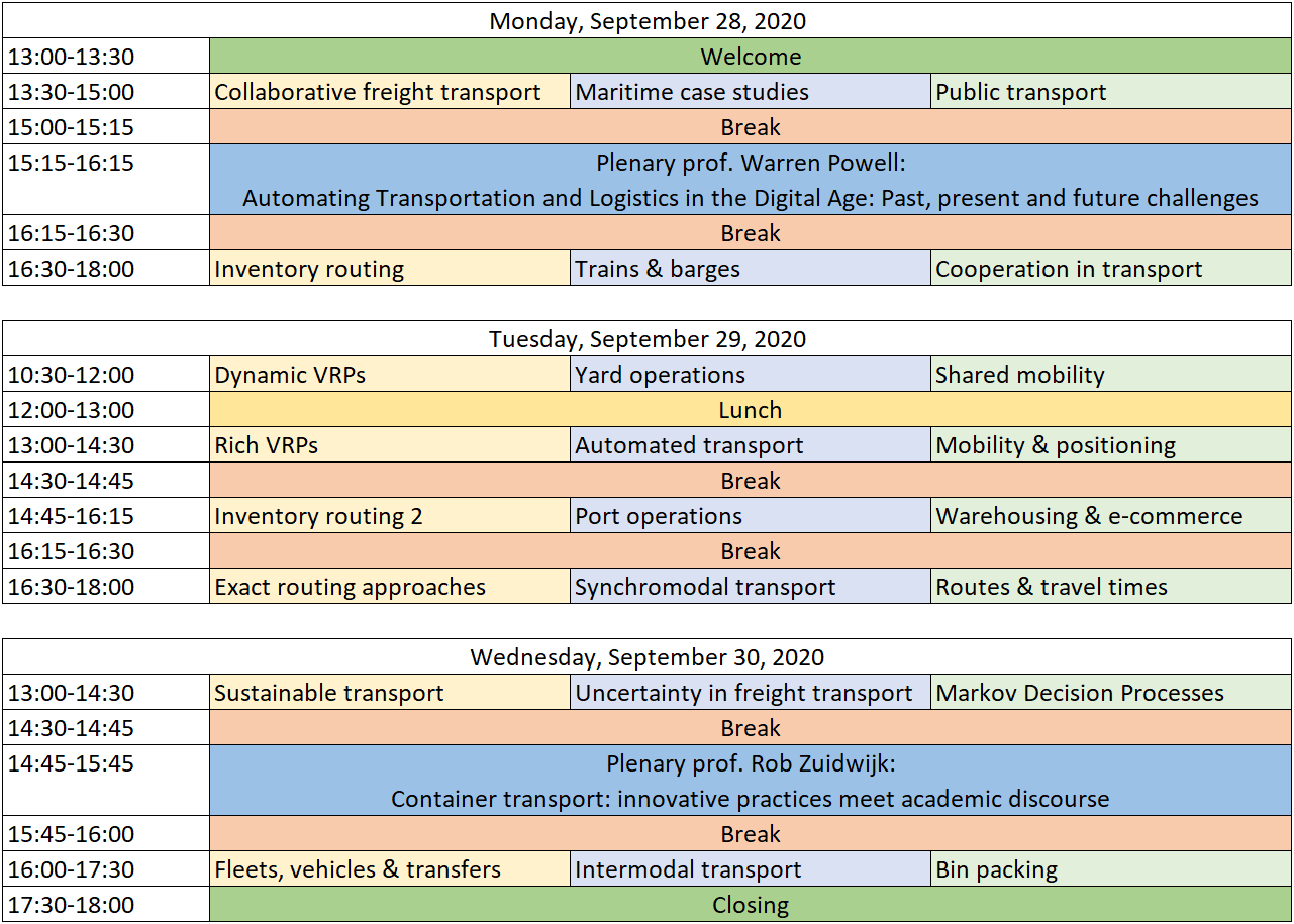Program
The conference program as well as the book of abstracts can be found below. Note that all talks within the parallel sessions have a duration of 30 minutes including discussion. All presentations will be given live using the Zoom meetings (click here for instructions). The times shown are based on Central European Summer Time (time zones can be confusing, so just use the time zone of Amsterdam, The Netherlands). We decided to create a compact schedule with three parallel sessions to accommodate attendees from different time zones (such that, e.g., attendees from the US and Latin America can attend in the morning and attendees from China and Japan in the evening).
A high-level overview of the program can be found below.

Computational Logistics
11th International Conference on Computational Logistics, ICCL 2020, Enschede, The Netherlands, September 28–30, 2020, Proceedings
Keynote speakers
Prof. Warren B. Powell
Department of Operations Research and Financial Engineering
Princeton University
Automating Transportation and Logistics in the Digital Age: Past, present and future challenges
Amazon and Uber have shown the way to the digital era in transportation and logistics in the post-2000 era, exploiting the power of the internet and the explosive growth in the use of smart phones. Less visible is the growth of major freight companies such as UPS, DHL, FedEx, along with major shipping companies such as Maersk and domestic postal services. Today, there is an explosion of services that require fast delivery of products and services with 2-day, same-day and real-time response.
Today, we are looking at the possibility of fully-digital transportation operations, where people primarily monitor systems while computers perform all the “thinking” tasks previously performed by people. We have become accustomed to using statistical models and machine learning to perform inference and prediction. The next phase will be using computers to make decisions, especially those implemented in an operational setting.
I will talk about the evolution of modern analytics in transportation and logistics, beginning with network models and heuristics in the 1970s and 1980’s, and the emergence of powerful deterministic optimization solvers in the 1980’s and 1990’s. Throughout this period, transportation companies have had to deal with uncertainty, but only recently have we started to develop the type of general modeling frameworks long enjoyed by deterministic optimization. I will give the highlights of this framework, and then bring out the challenges that still remain in the path to full automation.

Prof. Rob Zuidwijk
Professor of Global Supply Chains and Ports
Rotterdam School of Management (RSM)
Erasmus University Rotterdam
Container transport: innovative practices meet academic discourse
The international transport of maritime containers employs multiple transport means, such as deep-sea vessels and trucks, or alternatively river barges and train sets. The planning and execution of combined transport operations is challenging, since resources are to be orchestrated efficiently while delivery of service must be reliable.
To address these challenges, the port of Rotterdam and its hinterland have become a living laboratory, where practitioners are performing pilot studies and academics develop new methods to put innovative logistics concepts to the test.
In the presentation, I will discuss how Synchromodal transport solutions offer mobility of freight instead of specific transport capacity. Containers that need to be transported are matched with transport options in a dynamic way. Practitioners have demonstrated the feasibility of the concept, while academics have elaborated on various decision models in support of e.g. network design, capacity planning, and routing. The living lab now progressively involves new modes of transport, such as semi-automated trucks that dynamically form platoons where consolidation is viable.
Advanced planning concepts, where multiple modes of transport are involved, tend to be more data intensive. However, the transportation industry is progressively recognizing the value of data as a strategic asset, not to be shared without compensation. Therefore, a proper understanding of what data is needed to enhance quality of planning is key. In some cases, a marginal improvement of data quality may already help create better prognostics and planning. In this vein, academics have been able to feed their methods and insights back to practitioners. As such, container transport connects innovative practices and academic discourse.
